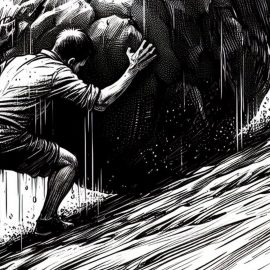

This article is an excerpt from the Shortform book guide to "The Laws Of Human Nature" by Robert Greene. Shortform has the world's best summaries and analyses of books you should be reading.
Like this article? Sign up for a free trial here .
What is long term thinking? Why are people bad at it and why should you adopt long term thinking processes?
Long term thinking is when you’re able to think about the future and make good long term decisions. In general, people are bad at long term thinking.
Read more about long term thinking and how it works.
People Are Bad at Long Term Thinking
In the previous law, we looked at irrationality, a potentially self-sabotaging trait we all share. Now, we’ll look at a second universal trait—our inability to think long term.
Humans tend to be concerned with the present rather than the future because our brains evolved to look for immediate rather than far-off danger. This was beneficial in earlier times when all our problems were animal-like—eat, sleep, avoid predators, and so on. We didn’t need to understand complex situations or reason; we needed to notice the most dramatic elements of a situation and react quickly. We also tended to assume the current conditions were permanent.
Now, however, this evolutionary adaptation is to our detriment. The world is more complicated and long-term dangers are larger problems than most of what we’ll encounter in the present. For example, we pay more attention to terrorism than global warming, even though global warming is far more dangerous. Additionally, our attention spans are even worse because of technology, which is distracting.
In this law, we’ll learn how to control our own nature by replacing shortsightedness with long term thinking.
Adopt a Farsighted Perspective
When you see any of the signs of shortsightedness in yourself, you can break out of this law’s thrall by adopting a farsighted perspective, which involves simulating hindsight and giving yourself perspective unclouded by emotions. This is how you adopt long term thinking.
There are three elements to a farsighted perspective:
- Detachment. When you encounter a problem or decision, try to look at it without emotion.
- Completeness. When you encounter a problem, there will be some obvious, attention-grabbing elements. Look at all the context, not just what’s most obvious.
- Prediction. For every possible decision, consider the negative consequences, new problems that might arise, and long-term goals.
This is easier said than done—most of us don’t like to think too much about the future because sometime in the future, we’ll die. We usually don’t think more than a few years ahead, and usually only vaguely.
The past also makes us think of the passage of time, so we avoid thinking of that too. This disconnects us from our past selves—the person we were back then doesn’t seem much like the current version of ourselves.
Thinking only about the present, however, is full of so many ups and downs that it causes anxiety. Accepting the passage of time will make it easier to manage your emotions.
- For example, if you can think about how you’ll see a current problem in a year, this will calm you down.
To change your views on the past and future:
- Cast time as an ally. Youth is fun, but you gain perspective with age.
- Create concrete goals and a clear path to achieve them. Anticipating your future accomplishments will be just as satisfying as enjoying the present.
- Remember that your character was set when you were a child. You’re still connected to past versions of yourself and recalling this maintains your identity. Additionally, if you can keep this in mind, you’ll be able to learn from the past.
Extended Example: The South Sea Company
In the 1700s, the South Sea Company created contagious shortsightedness in England that resulted in widespread financial ruin.
In 1719, the French Mississippi Company, which exploited resources in Louisiana, was doing very well and everyone in France was becoming rich as they bought and sold shares. This made English businessman John Blunt jealous and angry, and he decided to start a similar venture with the South Sea Company, which he led. The South Sea Company had a monopoly on trade between England and South America but did little trading. Its main job was to help the English government manage debt.
Blunt came up with an ambitious plan—the South Sea Company would take over the government’s large national debt, receive interest, and then sell the debt as South Sea Company shares.
However, there was one glaring problem with this plan—to make shareholders rich, the share price had to keep rising, but the company didn’t actually do any trade or have any assets. Blunt should have realized this—he was normally a shrewd businessman—but the hype in France got to him and made him focus on the present rather than the long term. Everyone else in England got caught up in the fever as well and invested their savings in shares, including very logical people like Sir Isaac Newton.
There were unexpected (from Blunt’s point of view) consequences. Blunt had inspired others to start new ventures and sell stocks, which increased competition for South Sea stocks. People cashed out their stocks to buy land, which was a safer investment. The Mississippi venture crashed and the French economy fell into a recession, foreshadowing a crash in England.
Blunt could only think of short-term solutions and many of them caused new problems. Soon the economy crashed, people committed suicide, and there was an attempt on Blunt’s life.

———End of Preview———
Like what you just read? Read the rest of the world's best book summary and analysis of Robert Greene's "The Laws Of Human Nature" at Shortform .
Here's what you'll find in our full The Laws Of Human Nature summary :
- Why it's in your nature to self-sabotage
- How you behave differently when you're in a group
- Why you're wired to want the wrong things in life






